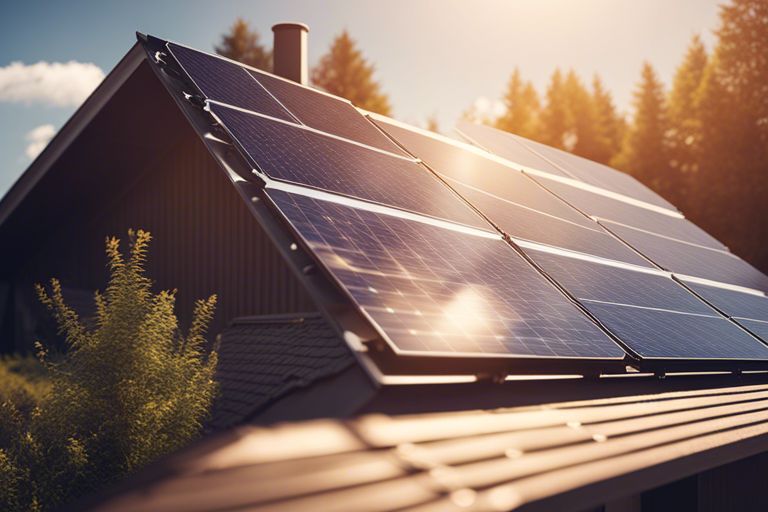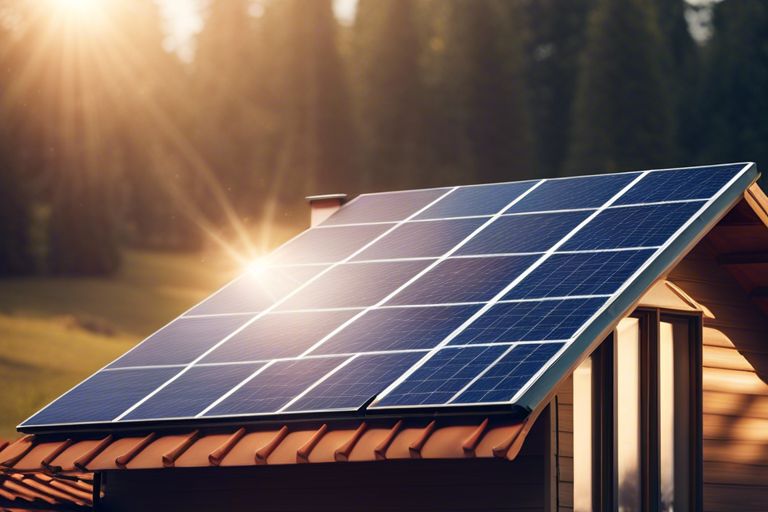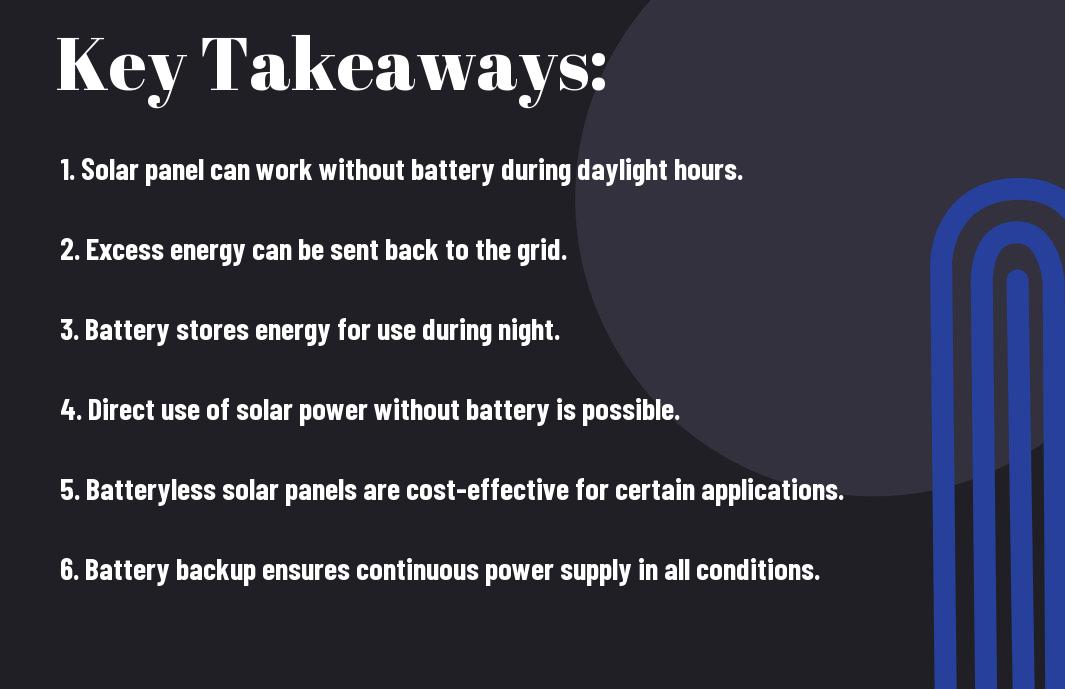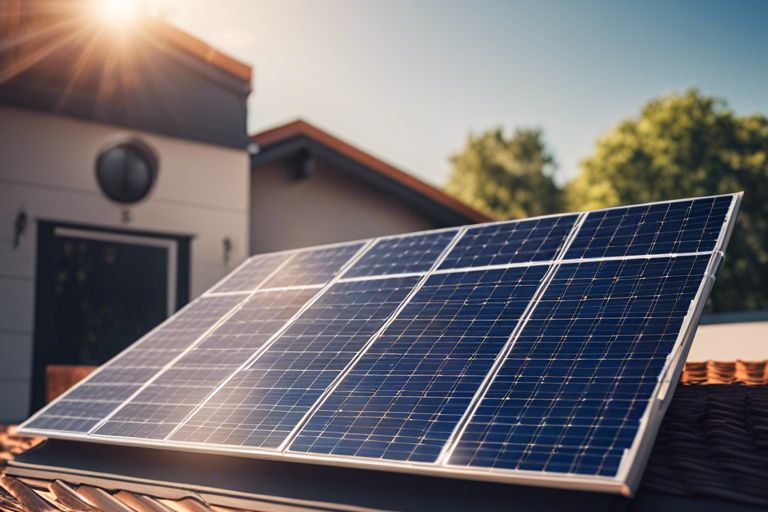Solar, with its brilliant technology harnessing power from the sun, illuminates the path towards a greener future. You may wonder – can a solar panel operate independently, devoid of a battery’s assistance? Let’s examine into the fascinating world of solar energy to uncover the answer to this intriguing question. Embrace the cosmos of solar power as we unravel the mysteries of its functionality without a battery by your side.
Key Takeaways:
- Solar panels can work without a battery: Solar panels can generate electricity during the day even without a battery. The electricity generated can be used or stored in the grid if a battery is not present.
- Continuous power supply: Without a battery, solar panels can still provide a continuous power supply during daylight hours. This can help reduce electricity costs and reliance on the grid.
- Less energy independence: While solar panels can work without a battery, having a battery storage system allows for greater energy independence, enabling energy use during evenings and power outages.
The Basics of Solar Panels
How Solar Panels Generate Electricity
To answer the question “Can we use solar panels without a battery?”, let’s start with the basics. Solar panels, made up of photovoltaic cells, are designed to convert sunlight into electricity. When sunlight hits the panels, the photovoltaic cells create an electric current by allowing photons from the sunlight to knock electrons free from atoms within the material of the solar panels. This flow of electrons generates an electric current, which can then be harnessed for various applications.
The Role of Photovoltaic Cells
On a fundamental level, photovoltaic cells within solar panels are key to the conversion of sunlight into electricity. These cells are typically made of silicon or other semiconductor materials that have specific properties enabling them to absorb light energy and release electrons. When sunlight strikes these cells, the photons energize the electrons, causing them to flow and create an electric current. This direct current (DC) electricity can then be converted into alternating current (AC) for use in powering your home or other electrical devices.
Basics: Photovoltaic cells work on the principle of the photovoltaic effect, which was first observed by French physicist Edmond Becquerel in 1839. This effect describes the phenomenon of certain materials generating an electric current when exposed to light. By harnessing this natural process, solar panels can effectively capture and convert sunlight into usable electricity without the need for moving parts or ongoing fuel sources.
The Need for Energy Storage
Why Batteries are Typically Used with Solar Panels
Solar panels generate electricity from sunlight, but this electricity is not always available when you need it. Without a battery storage system, the surplus electricity generated during the day is wasted if not used immediately. This is where batteries come in handy. They store excess energy for later use, ensuring you have power at night or during cloudy days. To learn more about how to utilize your solar inverter without a battery, you can check out How to Use Solar Inverter Without Battery.
The Benefits of Energy Storage
Storage of energy captured by solar panels offers numerous benefits. By storing excess energy, you can increase your energy independence and reduce your reliance on the grid, leading to potential cost savings. Moreover, having a battery backup can provide you with a reliable power source during blackouts or emergencies, offering peace of mind knowing that you have backup power available when you need it most.
Typically, energy storage systems are designed to be efficient and durable, ensuring that you can maximize the usage of the energy you generate from your solar panels. These systems also allow you to optimize your energy consumption by storing energy during low-demand periods and using it during high-demand times, helping you to further reduce your electricity bills and environmental impact.

Can Solar Panels Work Without a Battery?
Direct Connection to the Grid
Not any solar panel system requires a battery. When you connect your solar panels directly to the grid, you can harness solar energy during the day and send any excess electricity back to the grid, earning credits or payment for the energy you generate. This means you can still benefit from solar power without the need for a battery storage system.
Load Shifting and Peak Shaving
The beauty of solar panels lies in their ability to help you save on electricity costs. When you have a battery storage system in place, you can store excess energy generated by your solar panels during the day and use it during peak hours or at night when the sun isn’t shining. This process, known as load shifting and peak shaving, allows you to maximize the benefits of your solar panel system and reduce your reliance on the grid.
The ability to shift your energy usage to times when electricity rates are higher can lead to significant savings on your utility bills. By storing excess solar energy in batteries, you can avoid purchasing electricity from the grid during peak hours when rates are at their highest, ultimately helping you become more energy independent and cost-efficient.
The Drawbacks of No Battery
Many drawbacks come with using a solar panel without a battery. Two significant issues you may encounter include intermittent power supply and limited energy availability.
Intermittent Power Supply
For intermittent power supply, relying solely on solar panels without a battery means you will only have electricity when the sun is shining. This can be a problem during cloudy days or at night when solar panels cannot generate electricity. Without a battery to store excess energy generated during sunny periods, you may experience disruptions in power supply when solar energy is not sufficient.
Limited Energy Availability
On the topic of limited energy availability, without a battery, you have no way to store excess energy produced by your solar panels for use during times when sunlight is not available. This can limit your energy usage to only when the sun is out, potentially leading to energy shortages during periods of high energy demand or low sunlight. Additionally, without a battery, you may not be able to power vital appliances or devices during non-daylight hours.
Drawbacks of not having a battery system in conjunction with your solar panels can significantly impact your energy reliability and usage, especially during times when sunlight is limited.

Alternative Solutions
Grid-Tie Systems with No Battery Backup
On grid-tie systems without battery backup, the solar panels generate electricity during the day. This electricity is used to power your home, and any excess electricity is sent back to the grid. When your solar panels are not producing electricity, such as at night, you will draw power from the grid as usual. This setup eliminates the need for expensive battery storage systems, making it a cost-effective solution for many homeowners.
DC-Coupled Systems
DCCoupled systems are another alternative solution that allows solar panels to work without a battery. In this setup, the DC electricity generated by the solar panels is directly used to charge a high-voltage battery bank. The energy stored in these batteries can then be converted back to AC electricity using an inverter when needed. This design is efficient and can provide power even during grid outages.
To maximize the efficiency of DC-coupled systems, it is important to ensure that the components such as charge controllers, batteries, and inverters are properly sized and compatible. Proper installation and maintenance are crucial for the smooth operation of these systems.
Special Considerations
Off-Grid Systems and Remote Locations
To ensure that your solar panel system works effectively without a battery in off-grid systems and remote locations, you need to consider the challenges that come with intermittency of sunlight. In such scenarios, it is crucial to size your solar panels appropriately to generate enough energy during peak sunlight hours to power your devices while also considering energy storage options such as capacitors or supercapacitors.
Critical Load Requirements
To meet critical load requirements without a battery, you must carefully assess the energy needs of your important devices. Special consideration should be given to the wattage and voltage requirements of these devices to determine the appropriate solar panel size and configuration. Additionally, you may need to incorporate voltage regulators and inverters to ensure a consistent power supply for your critical loads.
Special attention must be paid to the power consumption patterns of your critical devices to avoid sudden power surges that could lead to system failures. By carefully analyzing and planning for your critical load requirements, you can optimize the performance of your off-grid solar panel system without the need for a battery.
Plus, monitoring the weather conditions and adjusting your energy usage accordingly can help you maximize the efficiency of your batteryless solar panel system in meeting your critical load requirements.

Final Words
Presently, you should understand that while solar panels can technically work without a battery, having a battery as part of the system allows you to store excess energy for use when the sun is not shining. The battery acts as a form of energy storage that can help make your solar power system more reliable and efficient. So, while a solar panel can function without a battery, adding a battery can greatly enhance the usability and effectiveness of your solar energy setup.
Q: Can a solar panel work without a battery?
A: Yes, a solar panel can work without a battery. The solar panel absorbs sunlight and converts it into electricity, which can be used immediately to power devices or be fed directly into the grid if excess power is generated.
Q: What are the benefits of using a solar panel without a battery?
A: Operating a solar panel without a battery can reduce overall system costs, as batteries can be expensive and require maintenance. It also eliminates the need for battery replacement, making the system more sustainable and hassle-free.
Q: Are there any limitations to using a solar panel without a battery?
A: One limitation of using a solar panel without a battery is that it cannot store excess energy generated during the day for use at night or during periods of low sunlight. This means that power may not be available when the sun is not shining, unless the system is connected to the grid.
